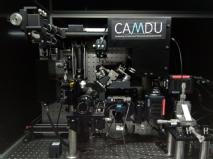Lattice LightSheet Microscope
The 3i Lattice LightSheet Microscope (LLSM) has "comparable" resolution to a confocal microscope with two significant advantages: faster imaging and considerably less photo-bleaching/photo-damage. Our microscope is based in the Centre for Mechanochemical Cell Biology and was originally Wellcome funded.
The microscope rapidly sweeps a thin sheet of light through the sample and is capable of imaging highly dynamic processes with hundreds of images a second. For example a 100-plane, 2-colour Z-stack can be taken in less than 1 second. Although usually for timelapses the speed is limited by photo-toxicity/bleaching.
The gentle imaging allows continuous recording over long time scales (hundreds to thousands of volumes).
- Resolution with deconvolution up to 230 x 230 x 370 nm (x x y x z) [1]. If you are prioritising spatial resolution for your live samples you may be better off using a different microscope, see here for advice.
- Maximum imaging depth 10-50 µm depending on sample and required image quality
- Two cameras allowing imaging in multiple channels
Please read this overviewLink opens in a new window of what to expect from a similar LLS system prior to considering use. Image processing is supported by CAMDU.
Please acknowledge the below in your publications and presentations, in addition to the usual CAMDU acknowledgment policy.
Wellcome Trust Multi-User Equipment Grant
Award Holder: Andrew McAinsh
Award Title: Probing intra-cellular dynamics with lattice light sheet microscopy
Reference: 208384/Z/17/Z
| Objectives | 0.71NA LWD WI (excitation), 1.1NA WI (imaging) |
| Lasers | 405 nm, 488 nm, 561nm, 642 nm |
| Cameras | 2 x Hamamatsu ORCA-Flash 4.0 v3 sCMOS |
| Incubation | flexible between 22 and 37 degrees Celsius, no CO2 |
| Filters | Dichroics: 561LP or 594LP dichroic Emission filters: 510/42, 550/88, 605/64, BLP01-647LP Notch filters for blocking lasers: 446/523/600/677, NF03-488E, NF03-633E See fpbase here for some of the possible setups. For the widefield imaging using the finder/bottom objective see fpbase here for filters/LEDs/camera. |
| Sample needs |
[1] Chen, B.-C. et. al. (2014). Lattice Light Sheet Microscopy: Imaging Molecules to Embryos at High Spatiotemporal Resolution. Science (New York, N.Y.), 346(6208), 1257998.
Visitors and Collaborators
Please see our Visitor Programme page.
If you are unsure about whether your experiment (or sample) is suitable for LLSM, feel free to send a general enquiry to .
Click here for a comparison of our microscopes.

